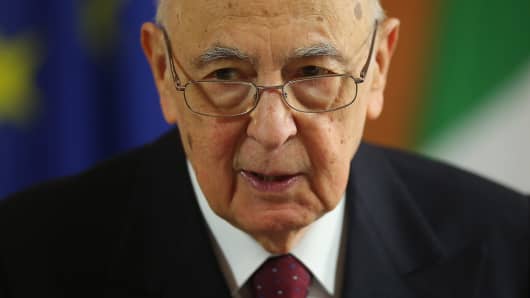Italy's president held urgent talks on Tuesday aimed at naming a prime minister to head a coalition government backed by the rival parties on the center-left and center-right and end two months of post-election stalemate.
Hopes that a government can be formed quickly gave a further boost to financial markets on Tuesday, with the yield on 10-year Italian government bonds dropping below 4 percent and the spread, or risk premium over German bunds, narrowing further.
Former Prime Minister Giuliano Amato is widely considered to be the favored choice of President Giorgio Napolitano, who has the final say and is expected to make the appointment late on Tuesday or Wednesday.
The young centre-left mayor of Florence, Matteo Renzi, also emerged as a possible candidate. Silvio Berlusconi's center-right People of Freedom (PDL) party said it had no objections to Renzi after his name was suggested by the centre-left Democratic Party (PD) late on Monday.
But Renzi, 38, who opinion polls indicate is the country's most popular politician, later played down the possibility.
"It's the hypothesis which is most surprising and least probable, I don't think it's on the table," he told reporters.
Delegations from the PDL and the PD will meet separately with Napolitano on Tuesday to make their proposals for who should lead the country following February's inconclusive election.
(Read More: Italy's President Reads Riot Act to Politicians)
The 87-year-old Napolitano is expected to make the appointment after completing his round of meetings with parties, raising the possibility that a government could be in place by the weekend.
Multi-Party Cabinet
Whether the new prime minister is Renzi, Amato or a surprise third figure, he is likely to forge a multi-party cabinet to take over from the technocrat government of Monti, who was appointed in late 2011.
Despite the market euphoria, a broad coalition between the right and left, which are far apart on most issues, might struggle for stability or to obtain the parliamentary backing needed for vital economic and political reforms.
At the election the center-left narrowly won a majority in the lower house but failed to win control of the Senate.
Pier Luigi Bersani, who announced his resignation as head of the Democratic Party last week, angrily blamed "traitors" in his own party for sabotaging the center-left's presidential candidates but said the party would have to get over its divisions.
"We have to find some semblance of order otherwise we can't be useful to this country," Bersani told a meeting of PD officials in Rome. Its inability since February to cut a deal with either Berlusconi's center-right or the shock new third force of Beppe Grillo's anti-establishment 5-Star Movement has left the country in limbo.
(Read More: Hollow Victory for Italy as More Turmoil Looms)
Renzi unsuccessfully challenged Bersani for the PD leadership last year and despite his popularity among the general public is viewed with suspicion by many in the deeply divided party.
Berlusconi has gone from strength to strength since the election, capitalising on the centre-left's crisis. An opinion poll on Tuesday by the Tecne polling agency gave the center-right a clear lead of around 8 points.
5-Star, which won a quarter of the vote and speaks for millions of Italians disillusioned with an entire political class, says it will sit in opposition in parliament. It will be joined by the leftist Left Ecology Freedom party, the former partner of the PD, which said it would also refuse to take part in a grand coalition government. Berlusconi's allies in the Northern League also said they did not expect to join the governing coalition.
President's Frankness
In his inaugural address to parliament on Monday, Napolitano made clear that he expected the parties to compromise and cooperate.
(Read More: Italy's Two Options: Hardball or Consensus)
"I have a duty to be frank. If I find myself once again facing the kind of deafness I ran into in the past, I will not hesitate to draw the consequences," he said - a clear warning that he will resign if the party leaders fail to take heed.
He berated the parties for failing to reform a dysfunctional electoral law and accused the parties of a "long series of omissions and failures, obstruction and irresponsibility".
(Read More: For Italy, Maybe Some Order From All the Chaos)
Financial markets welcomed his re-election and the prospect of a government with the power to take steps to revive the euro zone's third biggest economy, which is mired in recession.


